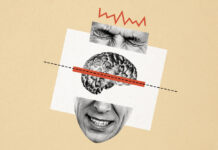A new study compared intensive cognitive behavioral case management (CBCM) with and without antipsychotic use in young people diagnosed with first-episode psychosis. The researchers found that there was no difference in outcomes at the six-month endpoint. Both groups improved, and there was no added benefit to having taken antipsychotic medications. The study authors, writing in Schizophrenia Bulletin, explain:
“There was no discernible advantage to receiving antipsychotic medication from the start of the trial,” the researchers write.
The study was led by Shona M. Francey at Orygen, The National Centre of Excellence in Youth Mental Health, Parkville, Australia.
 The study was triple-blinded, meaning that the researchers, clinicians, and participants all were unaware whether they were in the placebo or antipsychotic group. This prevents the biasing of results due to expectations of effectiveness.
The study was triple-blinded, meaning that the researchers, clinicians, and participants all were unaware whether they were in the placebo or antipsychotic group. This prevents the biasing of results due to expectations of effectiveness.
Both groups had approximately the same duration of untreated psychosis and initial severity of symptoms before receiving treatment. Both groups then received CBCM, intensive psychotherapy based on cognitive-behavioral therapy that also included case management. One group later received either risperidone or paliperidone (depending on when they were recruited), while the other group received a placebo designed to look exactly like the active medication.
The outcomes assessed by the researchers included “functioning” assessed by both the Social and Occupational Functioning Scale (SOFAS) and the Heinrich Quality of Life Scale (QLS). They also assessed depression, anxiety, and both “positive” (e.g., hallucinations, delusions) and “negative” (e.g., apathy, lack of speech, lack of emotion) symptoms of psychosis. The primary endpoint of the trial was six months.
The researchers found that there was no significant difference in outcomes on any of these scales at the six-month endpoint—meaning that the placebo was just as good as the antipsychotic medication.
“Both groups had improved on all measures of psychopathology after six months, and there were no differences between the groups,” the researchers write.
They write that this “challenges the conventional wisdom” on the role of antipsychotic medications, especially for the “positive symptoms” of psychosis.
Additionally, the participants who took antipsychotic medication discontinued the study at a higher rate, and earlier, than those taking placebo. Some of them reported leaving due to the adverse effects of the drugs they were prescribed.
Proponents of antipsychotic treatment might expect to see people discontinue the placebo group due to the worsening of symptoms or failure to improve—however, the researchers say that this did not happen.
“Importantly, there were not more discontinuations for clinical deterioration (worsening of symptoms) or failure to improve in the placebo group, nor were there more serious adverse events.”
The researchers also included less well-controlled information from 12-month and 24-month endpoints as well. Although they still found no differences between the groups except on one measure (“negative symptoms”), they state that these endpoints provide inconclusive information about whether the placebo was still as good as active antipsychotic medication.
Research on whether a longer duration of untreated psychosis causes worse outcomes is unclear. A study from 2017 found that there were no randomized, controlled trials comparing antipsychotic treatment to placebo in first-episode psychosis at all. Mad in America has provided an overview of the evidence for antipsychotic treatment, as well as their harmful effects.
Francey et al. reported their conclusions very conservatively, noting that “this finding can only be generalized to a very small proportion of FEP cases at this stage, and a larger trial is required to clarify whether antipsychotic-free treatment can be recommended for specific subgroups of those with FEP.”
****
Francey, S. M., O’Donoghue, B., Nelson, B., Graham, J., Baldwin, L., Yuen, H. P., . . . McGorry, P.D. (2020). Psychosocial intervention with or without antipsychotic medication for first-episode psychosis: A randomized noninferiority clinical trial. Schizophrenia Bulletin Open. DOI: 10.1093/schizbullopen/sgaa015 (Link)















Thank you Peter.
This is very valuable information and really needs to get out to parents and the education system, high schools, colleges and universities.
Report comment
Only 29% of the participants (n=26) completed the study. In addition to ingesting a toxic substance by halve of the participants, I am guessing this high drop-out rate also had something to do with the warm, caring, non-patronising and empathic attitude when participants are seen as inert objects acted upon by the clinical psychologists who “provided CBT” from a manual.
Of note also is that CBT is known to subtly teach people that they are expected to report improvement on outcome measures whether this is in a research or clinical setting. Not sure we should take any studies involving CBT all that seriously.
Report comment
Well we do try to pass the tests.
Report comment
Of course, passing the test to get out from under coercive “care” looks a lot different than actually thriving and anyone with any ounce of observational skills ought to be able to tell the difference.
Report comment
I came off neuroleptics with basic Psychotherapy but “people” can “Fu*k Off” with the term “Psychosis”.
But this is Very Good News!
Report comment
“They write that this ‘challenges the conventional wisdom’ on the role of antipsychotic medications, especially for the ‘positive symptoms’ of psychosis.”
Although, the reality is that the “conventional wisdom” is misguided. Since all doctors, including the psychiatrists, are taught in med school about anticholinergic toxidrome, which is oddly missing from all psychiatric DSMs.
https://en.wikipedia.org/wiki/Toxidrome
Despite the fact that knowledge of anticholinergic toxidrome proves that both the antidepressants and antipsychotics can create both “psychosis” and “hallucinations,” the “positive symptoms of schizophrenia.”
“Although they still found no differences between the groups except on one measure (‘negative symptoms’), they state that these endpoints provide inconclusive information about whether the placebo was still as good as active antipsychotic medication.”
But given the reality that it’s already medically known that the antipsychotics/neuroleptics can also create the “negative symptoms of schizophrenia,” via neuroleptic induced deficit syndrome.
https://en.wikipedia.org/wiki/Neuroleptic-induced_deficit_syndrome
I’m quite certain placebos will bring about better results for both the positive and negative symptoms of “schizophrenia,” since placebos don’t create both the positive and negative symptoms of “schizophrenia,” like the antipsychotics/neuroleptics are already medically known to do.
Report comment
Neuroleptics are not needed as Mad in America has continually maintained, and we’re getting to a point where “Schizophrenia” doesn’t exist.
I think the term “Psychotic” is widely misused. If a person can benefit from communication then surely they are not “Psychotic”.
Report comment
I would describe the people in the Study not as “Psychotic” but maybe with distress.
Report comment
Probably. Psicosis is overdiagnosed (good! more customers!) while true psicosis is undertreated/mistreared by therapists/physicians without a clue.
Report comment
I agree. I think you are spot on.
Report comment
Even when i try and go back to that place in my life and my learning when i had any respect for quantitative research being applied to human behaviour – which is a very big ask indeed these days – i get to that place where it just all seems stupid and the best such research has to offer as a result is ‘this applies to some people sometimes, sometimes yes, sometimes no.’ Especially, when i get to a statement such as this – ‘Francey et al. reported their conclusions very conservatively, noting that “this finding can only be generalized to a very small proportion of FEP cases at this stage, and a larger trial is required to clarify whether antipsychotic-free treatment can be recommended for specific subgroups of those with FEP.” ‘ – which pretty much means ‘if we get more people into the study and then do a lots of rats and stats analysis on the results, then it will be more true for more people than if we only have this small number that we started with.’ As opposed to being honest in the 1st place and saying, ‘What we’ve shown here is that this applies to some people some times, sometimes yes, sometimes no.’
Why is it seemingly impossible to admit that you were wrong in the first place, there are ample numbers of people speaking about the vast amount of harm done by misdiagnoses and antipsychotics and the ‘accepted wisdom’ is actually ‘accepted stupidity’ handed down – and accepted – despite all the evidence to the contrary.
Report comment
People hate to admit they’re wrong, especially when they’re making handsful of money at it!
Report comment
Very few people will ditch their 9 years of dogma training. And then, the question is, what do I do for a living. How do I explain to my family.
I think any psychiatrist with wisdom sees what a hoax it is, what he is being pulled into. I think they might realize it even while in school, but at that age, they don’t know what else they are cut out for.
And then, well it’s too late.
Imagine people “diagnosing” others who might not or DON’T work, when they themselves are limited to that one job, that one severe way of thought.
There are “meds” for that idealistic, severe belief system.
It is like other stubborn practices. people hang onto them if they have the power and support.
Report comment
What is intensive cognitive behavioral case management (CBCM)? Would being intensively case managed be pleasant?
CBT can only help with the minor problems that are caused by misunderstandings and miseducation. CBT based intensive psychotherapy is an oxymoron because major mental health difficulties are not caused by incorrect thought patterns. They are caused by the person being damaged.
A useful follow up study would be to compare people who recieve practical and emotional help and support, to people who receive CBCM. It may be that being intensively case managed and the cognitive reprogramming aspect of the psychotherapy were actually detrimental.
Report comment
” It may be that being intensively case managed and the cognitive reprogramming aspect of the psychotherapy were actually detrimental.”
I have experienced wanna be therapists. From blue light visioning to god knows what else. And then I looked around and realized just how crazy psychiatry and it’s ilk are, just how much it spilled into “therapy”, yet themselves claiming to not subscribe to the DSM… Yes, there is crazy, and it can function quite well. In fact, it is in the ignorance that crazy operates best.
Report comment